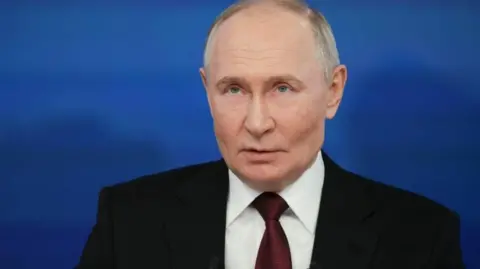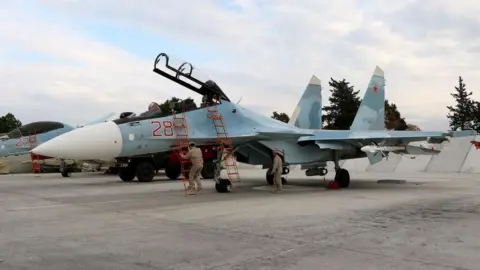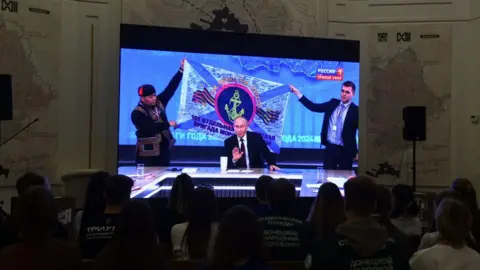 Reuters
ReutersRussian President Vladimir Putin said that Russia should launch a full-scale invasion of Ukraine earlier and be better prepared for war.
Putin told his year-end press conference on Thursday that in hindsight, “systems should have been prepared” for an invasion in 2022, which he called a “special military operation.”
Russia seized Crimea from Ukraine in 2014 and pro-Russian forces clashed in eastern Ukraine, but eight years later Putin tried to seize Kiev.
During his four-hour appearance, Putin also addressed domestic issues such as Syria’s deposed leader, Russia’s more aggressive nuclear doctrine and the price of butter.
The event, hailed as “Vladimir Putin’s annual achievement”, was broadcast live on major national television channels on Thursday.
Putin appeared in front of a large blue screen with a map of the Russian Federation and annexed parts of Ukraine.
He answered questions from the public, foreign journalists and pensioners – but it was a carefully planned and tightly controlled affair.
Asked by BBC Russia editor Steve Rosenberg if he thought the country was in better shape than when his predecessor Boris Yeltsin left it 25 years ago, Putin said Russia had regained its “sovereignty”.
“Given what has happened to Russia before, we are moving towards a complete loss of sovereignty.”
Asked about the fall of Assad’s regime in Syria, Putin insisted it was not a failure of the Kremlin – which had supported President Bashar al-Assad militarily for years – but admitted the situation was “very serious” complex”.
He said he had not yet spoken to the ousted Syrian leader, who fled to Moscow as rebels approached Damascus earlier this month, but that he planned to speak to him soon.
He added that Russia was in talks with Syria’s new rulers to retain two strategically important military bases on the Mediterranean coast and that Moscow would consider using them for humanitarian purposes.
 Getty Images
Getty ImagesRegarding US President-elect Donald Trump, Putin said the two had not spoken for four years but that he was ready to meet him “if he wanted to”.
When asked about Putin’s weakness compared with Trump, who is due to take office in January, Putin quoted the American writer Mark Twain: “Rumors about my death are exaggerated”, sparking a stir in the chamber. A burst of laughter.
Speaking of China, Putin said that relations between Russia and its eastern neighbors have reached an all-time high and the two countries are coordinating actions on the world stage.
“Over the past ten years, our level and quality have [Russia-China] The relationship between the two countries has reached a level that has never existed in our entire history,” he said.
Much of the meeting focused on the war in Ukraine, with Putin saying he was willing to “make compromises” to end the war – although it was unclear what such a compromise might mean.
He said Russian troops were making progress on the front lines “every day” and described his troops as “heroes”.
At one point, he pulled out a signed flag, saying it had been given to him by Russian marines “fighting for the fatherland” in the Kursk region, and asked two observers to hold it behind him for a photo.
 Getty Images
Getty ImagesHe also spoke about Russia’s construction projects in areas it seized from Ukraine, claiming that road standards in Ukraine’s Luhansk region have improved significantly since it was seized by Russian-backed forces in 2014.
When an audience member asked if the West had “received the message” that Russia was changing its nuclear doctrine, Putin pushed for passage in Novemberhe said “You’ll have to ask them.”
The new nuclear doctrine allows Russia to launch a nuclear strike against any country backed by a nuclear power.
This means that a large-scale attack by Ukraine against Russia with conventional missiles, drones or aircraft would likely qualify as a nuclear response, as would an attack on Belarus or any serious threat to Russian sovereignty.
Putin also highlighted the capabilities of Russia’s new medium-range ballistic missile, the Oreshnik, which struck Ukraine in November.
To test its power, he suggested that Russia should launch Oreshnik missiles into Ukraine, and that Ukraine’s air defenses – using systems supplied by the United States – should try to shoot them down.
As for the name “Oleshnike”? “Honestly,” Putin said with a laugh, “I don’t know. No clue.”
A dominant theme throughout the event was “Russian sovereignty”, with Putin claiming that reducing reliance on international partners – partly the result of Western sanctions – was one of the key achievements of his invasion of Ukraine.
He said the economy was “stable” and noted that growth was higher than in countries such as Germany, but admitted that an inflation rate of 9.1% was “shocking.”
In fact, the economy is overheated and highly dependent on military production—sometimes referred to as the “military-industrial complex.”
Throughout the speech, Putin also answered questions about domestic issues – from phone scams to young people’s difficulty getting mortgages.



